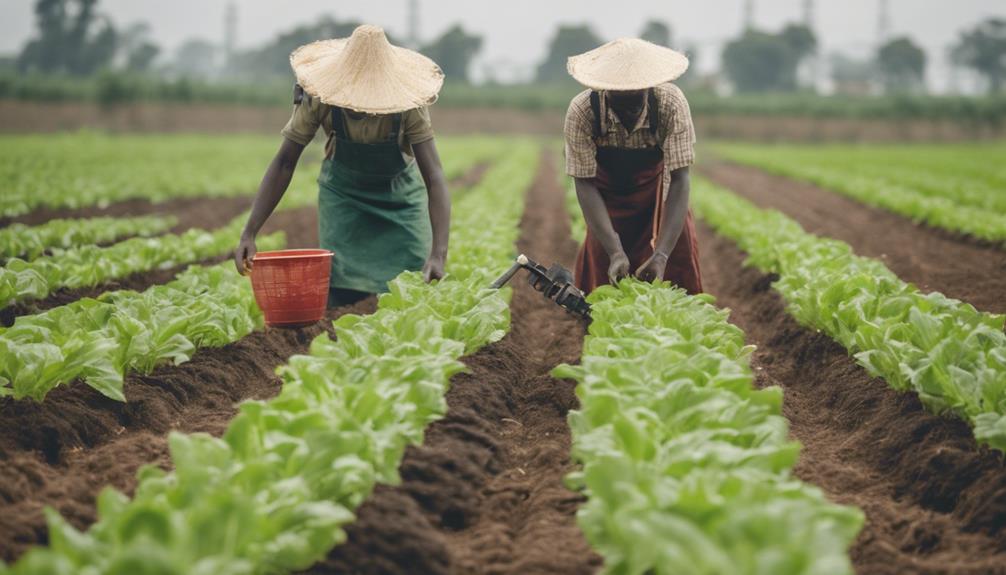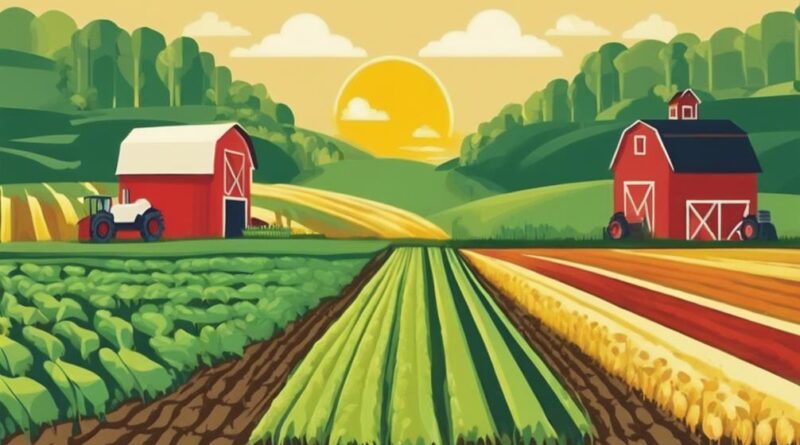Ethical Perspectives: Conventional Vs Eco-Friendly Farming
Imagine a field divided between two paths: one leading to traditional farming methods, the other to sustainable, eco-friendly practices. As you stand at this crossroads of ethical agriculture, ponder the implications each choice holds for the planet, animals, and your health.
The decisions made in farming ripple far beyond the fields, influencing ecosystems, communities, and future generations. So, which path will you choose, and what ethical perspectives will guide your journey through the complex landscape of food production and consumption?
Environmental Impact
How does farming affect the environment?
Farming practices have a significant impact on the environment, particularly in terms of carbon footprint and water conservation. Let's delve into these two crucial aspects.
When it comes to the carbon footprint of farming, it's essential to consider factors such as the use of fertilizers, machinery, and transportation. Conventional farming methods often rely heavily on synthetic fertilizers and pesticides, contributing to increased greenhouse gas emissions. In contrast, eco-friendly farming practices, such as organic farming or agroforestry, can help reduce the carbon footprint by promoting healthier soil ecosystems and utilizing natural fertilizers.
Water conservation is another critical issue in farming. Traditional farming methods can lead to water wastage through inefficient irrigation systems and excessive use of water for crop production. By implementing sustainable water management techniques like drip irrigation, rainwater harvesting, and crop rotation, farmers can minimize water wastage and preserve this precious resource for future generations.
Animal Welfare
Considering the ethical dimensions of farming practices, it's imperative to address the crucial aspect of Animal Welfare. Ensuring proper animal rights and ethical treatment in farming is essential for humane farming and welfare standards. When it comes to Animal Welfare, here are a few points to consider:
- Animals have the right to live free from unnecessary suffering and harm. It's crucial to treat them with compassion and respect, acknowledging their capacity to experience pain and emotions.
- Humane farming practices prioritize the well-being of animals, providing them with adequate space, proper nutrition, and access to clean water. This not only benefits the animals but also contributes to the quality of the end products.
- Adhering to high welfare standards not only aligns with ethical principles but also fosters a sense of responsibility towards the environment and future generations. By ensuring the welfare of animals, we create a more sustainable and harmonious farming system.
Pesticide Use
Minimizing pesticide use is crucial for promoting sustainable farming practices and safeguarding environmental health. While pesticides are effective in controlling pests and increasing crop yields, they come with significant drawbacks, including health risks and environmental damage. Prolonged exposure to pesticides has been linked to various health issues, such as cancer, neurological disorders, and reproductive problems. Therefore, exploring alternative methods to reduce pesticide use is imperative.
One alternative approach to conventional pesticide use is integrated pest management (IPM). IPM focuses on preventing pests through cultural practices, biological control, and the targeted use of pesticides only when necessary. By incorporating natural predators, crop rotation, and trap crops, farmers can minimize the need for harmful chemical pesticides, thus reducing the health risks associated with their use.
Furthermore, organic farming practices emphasize the use of natural substances and biological controls instead of synthetic pesticides. These methods not only protect human health but also promote biodiversity and soil health. By opting for organic farming techniques, farmers can mitigate the adverse effects of pesticides on both the environment and consumer health.
Soil Health
Maintaining optimal soil health is essential for sustainable farming practices and ensuring long-term crop productivity. In the realm of regenerative agriculture, the focus is on nurturing the soil rather than depleting it. By implementing practices that promote soil health, such as cover cropping and minimal tillage, farmers can enhance the soil's ability to support abundant crop growth while also contributing to carbon sequestration.
When it comes to soil health, consider the following emotional aspects:
- Connection to the Earth: Witnessing the soil teeming with life can evoke a sense of interconnectedness with nature, reminding you of the importance of preserving this vital resource for future generations.
- Hope for the Future: Knowing that regenerative agriculture practices can restore degraded soils and mitigate climate change can instill a sense of optimism for a more sustainable and eco-friendly agricultural system.
- Responsibility: Understanding the impact of soil health on food security and environmental sustainability may evoke a feeling of duty to support farming methods that prioritize the well-being of the soil.
Biodiversity Preservation
To cultivate a thriving ecosystem on your farm, prioritize biodiversity preservation as a key element in sustainable farming practices. By focusing on habitat conservation and species protection, you contribute to maintaining a healthy and diverse environment. Ensuring a variety of habitats within your farm allows different species to thrive, promoting ecosystem balance and enhancing wildlife management.
Implementing practices such as creating hedgerows, wildflower meadows, or leaving patches of natural vegetation untouched can provide shelter and food sources for various organisms. By diversifying crops and rotating them seasonally, you can prevent soil depletion and pest outbreaks while supporting different species that rely on specific plants for survival. Additionally, avoiding excessive use of pesticides and opting for natural pest control methods can safeguard beneficial insects and pollinators, further enhancing biodiversity on your farm.
Strive to coexist harmoniously with the wildlife around you, understanding that they play a crucial role in maintaining the delicate balance of your ecosystem. Encouraging natural predators to help manage pest populations can reduce the need for harmful chemicals, benefiting both your crops and the environment. By actively participating in biodiversity preservation efforts, you not only contribute to the health of your farm but also foster a sustainable and ethical approach to farming that respects the interconnectedness of all living beings.
Consumer Health
Promoting a healthy lifestyle through informed consumption choices is paramount when considering the impact of farming practices on consumer health. When it comes to choosing between conventional and eco-friendly farming methods, your well-being should be a top priority. Here's how different farming practices can directly influence your health:
- Nutritional Benefits: Opting for produce from farms with organic certification ensures that you're consuming fruits and vegetables that are grown without synthetic pesticides or fertilizers. These organic products often contain higher levels of essential vitamins and minerals, promoting your overall health and well-being.
- Food Safety: Eco labeling requirements on products indicate that they've been produced following specific environmental standards. This not only benefits the planet but also ensures that the food you consume is free from harmful chemicals and pesticides, reducing the risk of health issues related to contamination.
- Eco Labeling Requirements: By supporting farms that adhere to eco labeling requirements, you're encouraging sustainable farming practices that prioritize both environmental health and consumer well-being. This conscious choice contributes to a healthier food system and ultimately benefits your health in the long run.
Fair Trade Practices

When supporting fair trade practices in farming, you ensure that producers receive equitable compensation for their goods. Ethical sourcing is at the core of fair trade, emphasizing transparency and respect throughout the supply chain. By choosing products that adhere to fair trade principles, you play a vital role in promoting fairness and sustainability in the agricultural sector.
Ethical sourcing involves considering the welfare of farmers and laborers involved in the production process. It ensures that workers are treated fairly, paid decent wages, and operate in safe working conditions. Through ethical sourcing, you contribute to creating a more just and equitable system that values human rights and dignity.
Supply chain ethics play a crucial role in fair trade practices. This concept focuses on the integrity of the entire production process, from sourcing raw materials to delivering the final product. When you support fair trade, you help uphold ethical standards in the supply chain, fostering accountability and social responsibility among all stakeholders involved.
Sustainability
Supporting sustainable farming practices involves prioritizing long-term environmental and economic viability in agricultural operations. By implementing organic certification, farmers commit to reducing synthetic inputs, promoting soil health, and fostering biodiversity. This not only benefits the land and surrounding ecosystems but also ensures that the food produced is free from harmful chemicals, promoting a healthier lifestyle for consumers like you.
In addition to organic certification, water conservation plays a crucial role in sustainable farming. By utilizing innovative irrigation techniques and implementing water-saving practices, farmers can minimize water wastage and preserve this precious resource for future generations. This commitment to water conservation not only safeguards the environment but also ensures a more sustainable supply of fresh water for communities and ecosystems to thrive.
When you choose to support sustainable farming practices that prioritize organic certification and water conservation, you're making a conscious decision to protect the planet and its resources for years to come. Your choice contributes to the health of the environment, promotes ethical agricultural practices, and supports a more sustainable food system. By being mindful of where your food comes from and how it's produced, you play a vital role in shaping a more sustainable future for agriculture and our planet as a whole.
Frequently Asked Questions
What Are the Economic Implications of Transitioning From Conventional Farming to Eco-Friendly Farming Practices?
When you transition from conventional to eco-friendly farming, you can experience cost benefits due to reduced chemical inputs and improved soil health.
This shift also positively impacts the environment by decreasing pollution and preserving biodiversity.
Meeting market demand for sustainable products aligns with long-term sustainability goals.
How Do Cultural Beliefs and Traditions Influence the Adoption of Eco-Friendly Farming Methods?
Cultural influences play a significant role in how farmers choose between eco-friendly and conventional methods. Traditional practices deeply rooted in your community's beliefs can shape your farming decisions. These beliefs may prioritize sustainability and harmony with nature, guiding you towards eco-friendly methods.
Conversely, if conventional farming has been a long-standing tradition, it might be challenging to break away from it due to cultural norms and values.
Are There Any Potential Barriers or Challenges Faced by Farmers When Transitioning to Eco-Friendly Farming Practices?
When transitioning to eco-friendly farming, you might face barriers like initial investment costs, adjusting to new practices, and potential economic implications. Cultural influences can also play a role in how smoothly the transition goes.
Understanding these challenges and seeking support from experts or community resources can help make the shift more manageable. Stay open to learning and adapting to overcome these barriers and reap the benefits of sustainable farming practices.
How Do Government Policies and Regulations Impact the Shift Towards Eco-Friendly Farming in Different Regions?
Government policies and regulations play a crucial role in shaping the shift towards eco-friendly farming in various regions. By offering incentives and establishing guidelines, governments can encourage farmers to adopt sustainable practices.
These policies can influence market dynamics by creating demand for environmentally friendly products and fostering a more sustainable agricultural sector. Ultimately, government intervention can be a driving force in promoting eco-friendly farming practices on a larger scale.
What Role Do Consumers Play in Promoting and Supporting Eco-Friendly Farming Initiatives?
Consumers hold significant power in driving the shift towards eco-friendly farming. Your choices impact market demand, influencing farmers and companies to adopt more sustainable practices.
By supporting eco-friendly products and demanding transparency in the supply chain, you encourage the industry to prioritize environmental responsibility.
Consumer behavior plays a crucial role in promoting and sustaining initiatives that benefit the planet and future generations.
Conclusion
In conclusion, when comparing conventional and eco-friendly farming practices, it's clear that the latter has a more positive impact on the environment, animal welfare, pesticide use, soil health, biodiversity preservation, consumer health, fair trade practices, and overall sustainability.
By choosing eco-friendly farming methods, we can help protect our planet and promote ethical practices in agriculture for a better future. Make the sustainable choice for a healthier world.
